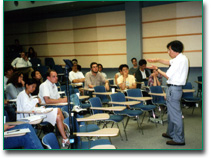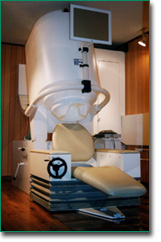  |
 |
 |
BSI Summer Program 1999 Held |
 |
RIKEN Brain Science Institute Summer Program 1999 was held for two weeks from July 26 to August 6. This was the first summer program of intensive lecture courses, and 16 lecturers who play active roles in the forefront of brain science studies, including Prof. Susumu Tonegawa of MIT were invited. About 50 young researchers from home and abroad were also invited.
The program mainly consisted of lectures from the first-rate lecturers, but by making the most of the remaining hours there was also enough time to visit laboratories, to announce the research results, and also for self-introductions by all the attendees. In addition, excursions were scheduled on the weekends, through these events researchers attending from ten countries around the world and BSI researchers could carry out vigorous exchanges. Many voices were heard welcoming the substantial contents of the program and wishing to attend the program again in the future. In addition to the lecture courses, internship courses were also offered in which the researchers joined each of BSI's laboratories for about two months. This attained the significant result of having the attendees acquiring techniques as well as the development of studies.
|
|
This type of summer program is commonly provided by first-rate universities and research institutions in Europe and the U.S. for the education and training of young researchers. In Japan, however, it is still rare to hold such programs, and as a result we experienced many problems in planning and management. However, we could realize a unique summer program characterized by BSI's features. The opinions heard from the attendees and from the BSI members convinced us of the significance of this implementation. We wish to continue this program in order to contribute as much as possible to the cultivation of young researchers in the field of brain science and the advancement of neuroscience around the world.
|
 |

A conference at the BSI Summer Program 1999
|
 |
 |
Installed the MEG Unit |
 |
In the March this year, the laboratory for Human Brain Dynamics (Head, Dr. Andreas A. Ioannides) installed its magnetoencephalography (MEG) unit in the basement of the east building of BSI. MEG measures the magnetic field generated by normal brain activity, such as looking, listening or simply thinking. Using the MEG, we can study the brain with high temporal resolution (i.e. msec order) and at least for superficial sources with reasonable spatial resolution, well within one cm.
|

The MEG Unit
|
 |
The hardware is placed inside of magnetically shielded room to make possible the recording of the very weak magnetic field generated by the brain; this field is about one hundred-millionth (1/100,000,000) of the earth's magnetic field. The actual measurement relies on superconducting quantum interface device (i.e. SQUID). 151 SQUID sensors are placed inside the helmet so that the activity around the whole head can be recorded simultaneously. Additional 64 ch EEG can also be placed on the head to record simultaneously electrical potential on the scalp.
In the immediate future MEG together with other functional brain imaging modalities, especially fMRI is expected to make big contributions to the understanding of how information processing is segregated to specialized areas and then comes together, probably in time, to make up a unified perception.
|
 |
 |
The Laboratory for Motor System Neurodegeneration Started |
 |
On July 1, the Laboratory for Motor System Neurodegeneration was launched as the third team of the Molecular Neuropathology Group. The Head, Dr. Ryosuke Takahashi, has consistently studied neurodegenera-tive diseases and apoptosis from the time he formerly worked at the Tokyo Metropolitan Institute for Neuroscience.
This team aims to elucidate the molecular mechanisms that causes neurodegenerative diseases such as amyotrophic lateral sclerosis (ALS) and Parkinson's disease, which are characterized by disorders of the motor system, based on the production and analysis of disease models at cellular and animal levels.
Recent studies have revealed that apoptosis, which is an active self-destruction mechanism of cells, is deeply related to neurodegeneration. Therefore, this laboratory will also work on clarifying the signal route of apoptosis that affects the neurodegenerative process, as well as basic research for the treatment of neurodegenerative diseases with apoptosis inhibitory factors.
|
 |
 |
 |
|
|
|






